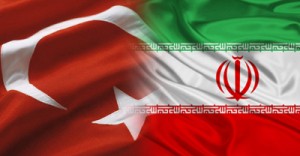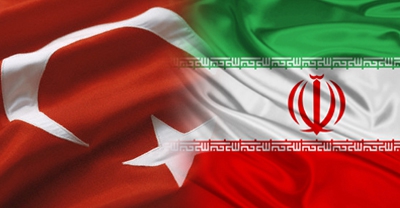 This article was written by Elisabeth Iskander�for the Al-Ahram Weekly on Wednesday November 21, 2012. Elisabeth Iskander�is a�research fellow at the german Institute for Global and Area Studies and expert on Iran.
This article was written by Elisabeth Iskander�for the Al-Ahram Weekly on Wednesday November 21, 2012. Elisabeth Iskander�is a�research fellow at the german Institute for Global and Area Studies and expert on Iran.Ankara and Tehran have long vied, albeit quietly, for regional predominance. Key to the outcome of that struggle is Syria
The Arab Spring has not only caused political shockwaves in Arab countries, it has also has altered the way Turkey and Iran view Arab states. This much is clear as Turkey�s public diplomacy efforts go into overdrive in their promotion of the �Turkish model� as a guide for political transformation in Egypt. It is also evident in Iran�s insistence on defining the uprisings as an �Islamic awakening� inspired by its model of Islamic revolution.
But as well as forcing a reconsideration of Turkish and Iranian policies towards Arab nations, the events of the Arab Spring have also affected how Turkey and Iran view each other. Relations between Iran and Turkey have always defied easy categorisation and in the past have tended to be overlooked in the Arab-centric discourse of internal Middle Eastern politics. Yet Turkey and Iran have a long and chequered history in negotiating their position vis-�-vis each other that gives insights into the mechanisms that support regional stability and those factors that appear to threaten it.
The rivalry between Turkey and Iran is part of the region�s history; repeated conflicts were waged between the Ottoman and Persian empires as they struggled for regional hegemony and supremacy. In 1639, the Treaty of Zuhab (also known as the Treaty of Qasr-e Shireen) led to the establishment of a border but not the end of conflict, and tensions along the border region led to repeated outbreaks of violence. A second Treaty of Erzurum was eventually signed in 1847 that stabilised the situation but it did not eradicate the longstanding rivalry for spheres of influence.
This has not ruled out strategic alignment. During the Cold War period, both Turkey and Iran adopted a pro-Western stance and, as founding members of the Baghdad Pact in 1955, they even became allies in the region. Economic cooperation has also been a feature of bilateral relations and often a mechanism to contain political mistrust. Iran and Turkey are traditional trading partners and according to recent Press TV reports in November, Iran is now Turkey�s third largest trade partner with the level of trade in the first eight months of 2012 standing at $17.52 billion. Turkish and Iranian authorities have confirmed their intention to increase levels of trade to $30 billion by 2015.
This growing trade relationship has been consolidated despite political and ideological clashes. After Iran�s Islamic revolution in 1979, the harmony in foreign policy and regional strategic alliances broke down. In particular, revolutionary Iran�s stance vis-�-vis America and Israel destabilised Turko-Iranian relations. This was further complicated by security concerns, especially regarding the Kurdish issue, which led to a series of disputes in the late 1990s in which Turkey saw Iran as a supporter of Kurdish groups.
Security has not been the only cause of suspicion. During the 1980s and 1990s, Turkish and Iranian rhetoric suggested that the two nations saw themselves on opposite sides of an ideological struggle as well. Iran viewed Turkey as aggressively secular, which was inevitable with Turkey representing a radical secularist worldview and Iran a radically Islamist one. Yet realpolitik seemed to ensure that rhetoric did not boil over into armed conflict. This mutual awareness that good relations between Turkey and Iran were crucial for economic growth and stability eventually evolved and led to stronger ties with Iran in the late 2000s.
The rise of Turkey�s Justice and Development Party (JDP) and its �zero problems with neighbours� strategy undoubtedly facilitated this rapprochement between Iran and Turkey. In October, Fatemeh Zolfaqariyan wrote in Mardom Salari, the official daily newspaper of the Iranian pro-reform party of the same name, that: �Turkey will have better political and economic relations with Iran compared to when it was secular.� Zolfaqariyan went on to describe the JDP�s strategy as the implementation of �civil Islam�, which is apparently more acceptable for Iran. Yet Turkey is still a secular state, as Turkish Prime Minister Recep Tayyip Erdogan emphasised during his visit to Egypt in September 2011.
Indeed the Arab Spring has introduced yet another phase in complicated Turko-Iranian relations because it has been shown that the Turkish �zero problems with neighbours� foreign policy strategy is difficult to maintain, particularly in light of the ongoing conflict in Syria, an ally of Iran. It will also become more complex as Turkey seeks to claim a larger and more visible role in regional affairs. Both Iran and Turkey have put themselves forward as models for political transformation in the post-Arab Spring Middle East.
In recent years, Turkey has been able to inspire confidence in its model among Arab states and peoples. As a result, it is likely that Turkey will outflank Iran in terms of gaining soft power in the post-Arab Spring Middle East. But it cannot go too far in this because of the need to balance relations with Iran to ensure domestic stability and prosperity, as well as stability for the entire region. In fact, increased influence for Ankara means increased responsibility, a greater weight of expectation and more strident competition with other regional powers.
Consequently, political relations between Iran and Turkey are likely to become more complicated but security and economic concerns will support continued bilateral relations, as they have for decades if not centuries. This is inevitable since Turko-Iranian relations are influenced by events and trends in the political and strategic environment of the Middle East and have a major role to play in return. In addition, it is noteworthy that Turko-Iranian relations are not only played out in the theatre of the Middle East, but their competition over spheres of influence also extends into Central Asia. This adds a further layer of complexity to potential rivalries between the two nations.
If Turkey is to boost its claim to being a regional model on the basis of deep liberalisation and democracy and secular government, there will be rhetorical clashes with Iran that seeks to be a model of revolutionary Islamic government for Arab states experiencing post-uprising transformations. The outcome in Syria is the main factor in determining the extent of rivalry or partnership between Iran and Turkey in the short term. If no understanding can be reached, rivalry over regional leadership will be the major feature in Turko-Iranian relations, even while economic partnership continues.
The Iran Project is not responsible for the content of quoted articles.











